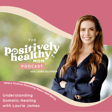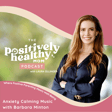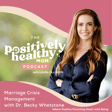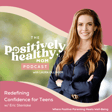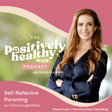Introduction and Welcome
00:00:00
Speaker
Hey moms, it's Laura Olinger.
00:00:02
Speaker
Welcome to the Positively Healthy Mom podcast.
00:00:05
Speaker
This episode is part two of my conversation with Jodi Rae Solomon, a life coach and trainer for Robbins Research International.
Understanding Human Needs
00:00:13
Speaker
OK, so before we switch gears into our next topic, I did want to hit on one more point about the six human needs relating to moms specifically in themselves.
00:00:22
Speaker
And so that might be where we transition into what we're going to talk about next.
00:00:26
Speaker
But, you know, what I have found in, you know, because I coach moms as well, not just teenagers, I coach moms.
00:00:34
Speaker
And moms are frustrated, they're tired, they're stressed, they're overwhelmed, they're all these things, right?
00:00:40
Speaker
And a lot of times one of the biggest ones is they don't feel appreciated or they don't feel like their contribution to their family is being noticed.
00:00:51
Speaker
And so what do you say to, now that we've like explained what these six human needs are, how do you feel like a mom can be
00:00:59
Speaker
um, get those needs met that she is needing, but without necessarily going to the members of the family, like without saying, Hey, teenage son, I'm really annoyed that you didn't just say thank you because I, uh, made your breakfast at 6am so you could get to football on time.
00:01:16
Speaker
Like, how do you, how do you, um, fulfill yourself with those needs without being a burden on your family member?
00:01:24
Speaker
Or do you be a burden on your family member?
00:01:26
Speaker
Just curious about your thoughts about that.
00:01:30
Speaker
First and foremost, it's understanding and recognizing what your personal top human needs
Importance of Recognizing Personal Needs
00:01:38
Speaker
Because that's your driving force.
00:01:41
Speaker
And so if you recognize in yourself, like right now, I'm really needing, you know, feedback from my child for saying thank you for making breakfast because I need to feel significant.
00:01:54
Speaker
That's a different driving force than if I need my child to say that because I need to feel love and connection.
00:02:03
Speaker
So understanding what your human needs are can help you also then understand why am I seeking this?
00:02:13
Speaker
Because once I understand why I'm seeking something based on what my human needs are, then I can shift or pivot.
00:02:20
Speaker
Either I, okay, if I'm looking for this feedback because I have a need for significance, then perhaps...
00:02:31
Speaker
I get to the opportunity to shift my mindset into realizing that my significance comes from within, not from without.
00:02:42
Speaker
Or listing off all the other places or people in my life that have brought me a sense of significance who were not in the terrible teenage years.
00:02:55
Speaker
But if my driving force is love and connection, then I can reframe that to understand that it doesn't matter what somebody else gives me.
00:03:10
Speaker
Because again, love is a gift that you give.
The Inner Critic and Self-Worth
00:03:14
Speaker
It is not something that you get.
00:03:17
Speaker
So understanding what those your personal top human needs are is really key to understanding why it is you want the things you do and how to reframe it so that you can feel like those are getting filled up within them.
00:03:35
Speaker
I'm so glad you talked about that.
00:03:38
Speaker
Cause I do find a lot of moms just are carrying this kind of resentment toward their families for all the things that they do and kind of like towards their spouses or whoever else.
00:03:49
Speaker
And you know, it's because it's, it's, it's like, they're like getting those needs met, but in, in maybe a negative way or in the wrong way, or they're not prioritizing maybe a healthier need per se within the context.
00:04:01
Speaker
So I'm so glad you explained that so well.
00:04:04
Speaker
Okay, so now I would love to switch gears over into your specialty.
00:04:09
Speaker
So you are a coach to women.
00:04:11
Speaker
And so, you know, I know that you specialize in a lot of like inner child work, inner critic work.
00:04:18
Speaker
So what is kind of like the best way you can explain that to the moms listening?
00:04:23
Speaker
And how can you help them?
Transforming Negative Inner Voices
00:04:25
Speaker
Like, what advice can you give them today?
00:04:27
Speaker
So we all have a voice in our head and that voice is always talking to us 24 seven, unless you're meditating and you've learned how to, you know, shut the quiet or quiet the voice down.
00:04:39
Speaker
Um, the thing is, is the voice talks in both positive and negative.
00:04:46
Speaker
most people are hardwired to start listening to the negative side.
00:04:51
Speaker
And the reason is because we have a 2 million year old brain that was hardwired and designed to keep us safe.
00:04:58
Speaker
And so if, you know, we're walking down the path and there's a tar pit in front of us, our inner critic will stand up and start screaming, oh my God, you got to stop because you're going to fall in the tar pit and die.
00:05:14
Speaker
And so that causes us to stop up short.
00:05:18
Speaker
It immediately trains that voice in our head to realize, okay, I got the outcome.
00:05:25
Speaker
And so I managed to get this person to stop what they were doing and to pivot and save our lives.
00:05:30
Speaker
And we did it in a negative way.
00:05:32
Speaker
So that is the way we're going to repeat for the rest of her life.
00:05:37
Speaker
And that might work when we're five.
00:05:41
Speaker
It doesn't really work when we're, you know, 30, 40, 50, 60, because if it did, let me just tell you, we would all be reaching our dreams, hitting our goals and millionaires.
00:05:55
Speaker
Because we all have that inner critic telling us what's wrong all day long.
00:06:03
Speaker
And so I actually support women to understand where that voice originated from.
00:06:08
Speaker
What is the message underneath the message that that voice is really saying to you?
Inner Child Work and Belief Systems
00:06:15
Speaker
And then I help them to learn to, for lack of a better analogy, change the radio station so that we can start listening to the inner cheerleader or the side that is giving us the positive feedback so that we can drive forward.
00:06:33
Speaker
Now, when we look at what is the message underneath the message, when our inner critic is saying, oh, my gosh, you know, you're so fat.
00:06:43
Speaker
Laura, what do you think the message underneath that message might be?
00:06:48
Speaker
It would be I'm not good enough.
00:06:55
Speaker
What if I told you what your inner critic is actually saying to you?
00:07:02
Speaker
Are you ready for this?
00:07:05
Speaker
Cause not a lot of people understand this.
00:07:07
Speaker
Are you really ready?
00:07:08
Speaker
I'm very ready for it.
00:07:11
Speaker
What your inner critic is really telling you is that I realized that you have a goal of health and a value of health.
00:07:20
Speaker
You are not at the standard that you have set for yourself.
00:07:25
Speaker
And I want to see you hit that standard.
00:07:28
Speaker
However, our inner critic doesn't know how to say that to us.
00:07:31
Speaker
So instead it says you're fat.
00:07:35
Speaker
This is blowing my mind.
00:07:36
Speaker
Like, I think that's so cool.
00:07:37
Speaker
Like it's like, it's literally turning a negative voice into a positive voice.
00:07:42
Speaker
Like you just said, your inner cheerleader.
00:07:45
Speaker
So when we understand what the message underneath the message is, then we're able to empower our inner cheerleader.
00:07:54
Speaker
And that helps us get us to our goals.
00:07:57
Speaker
Now, another thing that I really help people to do is it's called, you know, or referred to as inner child healing.
00:08:05
Speaker
But I really go back with people and discover, like, where did that inner critic start from?
00:08:13
Speaker
When was she born?
00:08:16
Speaker
What is the primary belief system that she's created that is actually holding us back?
00:08:23
Speaker
Because we can say all the positive things we want all day long.
00:08:28
Speaker
But if we have a primary belief system that says we're not good enough or I don't deserve this or whatever it might say, it doesn't matter how much we incantate, we can only go so far.
00:08:39
Speaker
But when we go back and we look at what is our primary belief system, now we can start to debunk that and ask, is that really true?
00:08:52
Speaker
What would my life look like if that belief were not in existence?
00:09:00
Speaker
Do you find that this always comes from your parents, that inner belief system from your childhood, or is it from other places as well?
00:09:13
Speaker
It's from other places as well.
00:09:16
Speaker
It depends on what your childhood was like.
00:09:19
Speaker
Maybe those belief systems happened as a result of you modeling your parents.
00:09:25
Speaker
Maybe those belief systems came from a caregiver that you had or a primary person in your life.
00:09:33
Speaker
Maybe some of those belief systems were then supported by a peer group that you had.
00:09:39
Speaker
But the reality is that's just a support.
00:09:42
Speaker
It's very rare that that peer group is going to actually create the system.
00:09:47
Speaker
It's the, that belief system is usually already in place and it's a result of some trauma and what we perceive as a trauma that happened in our childhood that does not blame a parent.
00:10:02
Speaker
So if you're a mom thinking, Oh my God, I screwed my kids up.
00:10:05
Speaker
Just go ahead and release yourself from that blame because, uh, the reality is you have no control over what your child perceives as a trauma.
Letting Go of Guilt
00:10:17
Speaker
So your child might believe that it waited 10 minutes in its crib for you to come in and pick it up and, you know, take it out to socialize.
00:10:27
Speaker
And you thought you were being a great parent, but that was a trauma to your child.
00:10:32
Speaker
You have no control over that.
00:10:35
Speaker
Or maybe you just said something in passing to your spouse or to a family member and your child overheard it and created a story about it.
00:10:46
Speaker
You have no control of that.
00:10:47
Speaker
It doesn't mean you are a bad parent.
00:10:50
Speaker
So I am giving each one of you permission to release yourself from the agony and pain of blaming yourself for your child's development there.
00:11:02
Speaker
I love that totally because that is what kind of was forming in me, you know,
00:11:08
Speaker
emotionally, because that's what I find every mom I ever talked to, we, we have some form of guilt and blame on ourselves at all times about our kids.
00:11:17
Speaker
Like it's very hard to find a mom who feels like they've done everything perfect.
00:11:23
Speaker
And that's the thing.
00:11:23
Speaker
There is no such thing as perfect, but if they have a hard time kind of accepting their mom mistakes or forgiving their own mom mistakes.
00:11:31
Speaker
So, um, that would be a perfect way to, you
00:11:34
Speaker
you know, talk to them about it, which would be, well, you have no control over what, how your child interpreted, you know, that incident or that event or those words, right?
00:11:43
Speaker
Whatever you said.
00:11:44
Speaker
So would there be any other advice that you could give moms to kind of release themselves from that guilt and shame or whatever the feeling that they are having about their, you know, because moms, we all screw up, right?
00:11:58
Speaker
And we, some of us might do it,
00:12:01
Speaker
you know, much worse, not as much, you know, depending on kind of the models that we, how we were parents and all that stuff, but we don't need to go into that.
00:12:09
Speaker
So like, what would you say to a mom right now today?
00:12:13
Speaker
First and foremost, if you are feeling those feelings of guilt or shame, ask yourself where else do those feelings show up from?
00:12:25
Speaker
What other situations, where do those feelings originate from?
00:12:30
Speaker
Because I'm pretty sure that this isn't the first time you felt it.
00:12:35
Speaker
It's not the first situation.
00:12:37
Speaker
You've had other situations in your past where you've also felt that.
00:12:41
Speaker
So there's an originating belief there.
00:12:44
Speaker
And when we look at what is our originating belief about that, and then we can start to ask ourselves these questions like, is that true?
00:12:52
Speaker
How do I know that's true?
00:12:53
Speaker
What would my life look like if I didn't have that belief?
00:12:57
Speaker
But the second thing that I found for myself was the most crucial was just to remember two things.
00:13:06
Speaker
First, I did the best I could with the tools I had available at the time.
00:13:13
Speaker
And the second was that I was exactly the type of parent, exactly the person I needed to be in order for my child's soul to get what they needed on their journey in growth.
Modeling Growth for Children
00:13:33
Speaker
So that releases me from any guilt or shame because if I didn't provide those opportunities with my mistakes, my child wouldn't then at a later date have an opportunity to grow into an even better human.
00:13:53
Speaker
So I, so letting go of those things, but then how do you add in the positive?
00:13:59
Speaker
So adding in the self-love and the self-acceptance, like how do you, it's kind of like getting rid of the negatives or it's not getting ready, but it's more like releasing, you know, in my word, you might have a better word for it.
00:14:10
Speaker
And then kind of like adopting or accepting a new mindset.
00:14:15
Speaker
Like what would, what would you say about that?
00:14:18
Speaker
So going back to the two needs of the soul, which are growth and contribution.
00:14:24
Speaker
And when we look at growth, if you're not growing, you're dying.
00:14:29
Speaker
So if I handed you a plant and I said, you know what?
00:14:33
Speaker
I'm going to be gone for two weeks.
00:14:34
Speaker
When I get back, I want this plant to be alive.
00:14:40
Speaker
What would you do?
00:14:42
Speaker
I'd take care of it, water it, put it in the sun, whatever it needed.
00:14:48
Speaker
And some people might say, okay, well, I suck at taking care of plants, so I'm going to take a picture of it.
00:14:55
Speaker
That way you have a picture of it when you get back because it's probably not going to be in such great condition.
00:14:59
Speaker
Other people might run out to the store and get a brand new plant to replace it with because they killed it, whatever it was.
00:15:08
Speaker
Other people might hand back the plant and the plant is blooming even bigger.
00:15:16
Speaker
So the reality is that if you're not growing, you're dying.
00:15:22
Speaker
I don't want my plant back in the same condition that I got it.
00:15:28
Speaker
I wanted to have some type of growth, that growth I may or may not be able to see, but there's going to be growth.
00:15:36
Speaker
And so when we think about that, like, am I growing as a mom?
00:15:42
Speaker
Am I doing the things every day to make me better?
00:15:47
Speaker
And as long as I'm making me better, I cannot help but to make my child better because they are watching me and I'm their biggest role model.
00:16:03
Speaker
So that I feel like is probably, um,
00:16:10
Speaker
one of the most under, I don't know if it's valued or under misunderstood kind of concepts or ideas, because I see, you know, lots of moms really at all ages and stages, but I find this a lot in like the elementary moms or the preschool moms.
00:16:29
Speaker
So, you know, my youngest is in fifth grade, so I'm still in elementary school.
00:16:31
Speaker
I've got middle school or I've got high school.
00:16:33
Speaker
So I, you know, I've seen them all and I've seen them all at different stages.
00:16:36
Speaker
It's like this preschool and elementary school mom.
00:16:39
Speaker
It's like this feeling of like almost like servitude to our kids.
00:16:44
Speaker
Like I need to be the room mom and I need to have this type of birthday party with this cake and I need to have this play date and that Pinterest little party favors need to be like this and bubble.
00:16:53
Speaker
And it's like, whoa, you know, like it's funny because then, you know, you get to the high school mom stage and everybody's like, they're fine.
00:16:59
Speaker
We're just going to, you know, we'll show up to their games.
00:17:02
Speaker
You know, we don't like have that like indentured servant situation going on anymore.
00:17:06
Speaker
And so, you know, I just feel like it is doing our kids a disservice when we are kind of role
Impact of Social Media on Comparisons
00:17:15
Speaker
modeling that because we're lacking that like self-love, the self-care, the nurturing, that would be the perfect thing to show our kids.
00:17:24
Speaker
So, you know, how like would you help a mom just like,
00:17:29
Speaker
It's almost this like anxious attachment it feels.
00:17:32
Speaker
And maybe we go back to the needs, like maybe her need is significance.
00:17:36
Speaker
Is that what you would say?
00:17:38
Speaker
I would totally say that, Laura.
00:17:40
Speaker
That's exactly where I would head with this is, is it goes back to what is our human need?
00:17:46
Speaker
What is the driving force?
00:17:48
Speaker
And, you know, because so many moms, especially at that stage of rearing children,
00:17:56
Speaker
looking to be the perfect mom and we're now in a comparison fishbowl of social media so I have to compare myself to Susie's mom over there and see who's better as if there's actually a better and what does better look like and that brings me to the point of what kind of mom do you really want to be and
00:18:22
Speaker
what is the experience that you want your child to have?
00:18:26
Speaker
Because if you want your child to have the experience of mom being everything to everyone,
00:18:35
Speaker
you can do that and run yourself ragged.
00:18:38
Speaker
And then you'll be, you know, by the time they're out of the house and you're an empty nester, you will have forgotten who you are.
00:18:46
Speaker
And then by the way, you'll be coming to me because I can help you with that.
00:18:52
Speaker
Or, or you can start helping yourself now.
00:18:54
Speaker
And just remember that, you know what, as much as I want to be the perfect mom, the super mom,
00:19:02
Speaker
Did my kid have a great experience today?
00:19:06
Speaker
Did my kid feel loved?
00:19:09
Speaker
Did my kid feel important?
00:19:12
Speaker
Did I provide for my kids' human needs?
00:19:17
Speaker
Did I provide for their materials?
00:19:21
Speaker
And if those boxes are all ticked, it doesn't matter whether you were room mom or you brought cupcakes that were homemade or cupcakes that were store-bought.
00:19:33
Speaker
Because your child is going to look back and remember, did mom show up with love and care or did mom show up frantic and biting my head off because she was stressed?
Self-Care and Self-Love Tips
00:19:46
Speaker
Um, that's so awesome.
00:19:48
Speaker
And I have found that I've been able to kind of release myself from that comparison trap that mom trap, because I tell myself that nobody knows what it's like in my household, except for my kids.
00:20:03
Speaker
So I really, you know,
00:20:05
Speaker
this is not a bragging moment, but it's a moment of pride in myself that I feel like I provide a really nice atmosphere.
00:20:12
Speaker
It's a loving atmosphere, it's caring, it's calm, it's relaxed.
00:20:17
Speaker
Like it's very laid back and there's not a lot of like pressure or yelling or anxiety or anything like that.
00:20:22
Speaker
There's never a hurry up, let's go.
00:20:24
Speaker
There's not that because I've worked to become just like calm and present.
00:20:28
Speaker
And anytime we do face a snag, I let it roll off my back.
00:20:32
Speaker
And we solve for the future if there is an issue.
00:20:35
Speaker
So it sounds to me like you shifted a certainty need to an uncertainty need.
00:20:45
Speaker
Yeah, I'm just bringing that calmness.
00:20:48
Speaker
You've brought more uncertainty in and let go of the need for certainty.
00:20:54
Speaker
Which is so crazy.
00:20:55
Speaker
Because when the kids were younger, you know, it's exhausting getting them buckled in their car seats and this and that.
00:21:01
Speaker
And I think there's something about that that you really need certainty.
00:21:05
Speaker
And maybe it's because the kids temperaments at that age are so unhappable.
00:21:08
Speaker
uncertain and volatile.
00:21:10
Speaker
And so as the older they get, I'm more able to be like, okay, they're self-sufficient and you can kind of let go a little bit.
00:21:16
Speaker
Do you, do you think that's true?
00:21:22
Speaker
Okay, so we are about to run out of time.
00:21:25
Speaker
And before we do that, is there any, actually, I did want to guide our audience to, I created a little quiz online for anyone who wants to try to figure out a little bit more about their human needs.
00:21:36
Speaker
So if you go to positivelyhealthy.com slash human needs, you will find that assessment there.
00:21:43
Speaker
And it's just a free gift to the audience to just kind of help themselves, you know, figure out and get a little bit more connected and familiar with their human needs.
00:21:51
Speaker
So last words, Jodi, what would be your last kind of bit of tidbit advice for the moms today?
00:22:01
Speaker
I would actually just say, love yourself because the more you pour into you, the more you have to pour into others.
00:22:13
Speaker
So take time for you.
00:22:15
Speaker
And how, you know, you just said take time.
00:22:17
Speaker
What would be the last bit of advice about how you do that?
00:22:19
Speaker
Because that's what I found.
00:22:20
Speaker
I know you can't put it in that quick, but how do you do that, right?
00:22:23
Speaker
Some moms don't know how to do that.
00:22:25
Speaker
Close the bathroom door.
00:22:27
Speaker
Take a five-minute time out.
00:22:29
Speaker
Go for a walk around the neighborhood.
00:22:32
Speaker
You know, do something that's just for you to fill your cup up at some point.
00:22:39
Speaker
or just go put on a nice pair of bra and panties that you feel like a woman again, instead of just a mom and allow that to fill your cup.
00:22:51
Speaker
Okay, Jodi, how can people find you after today?
00:22:56
Speaker
So you can visit my website at www.soulamazing.com and find out more about me, my programs.
00:23:06
Speaker
I'm launching a brand new weight loss program because I've lost like 105 pounds in the last year, all because of mindset.
00:23:13
Speaker
And so I would love to support people on that journey as well.
Conclusion and Contact Information
00:23:18
Speaker
Or you can find me on Facebook.
00:23:19
Speaker
I have an amazing group called Empower Your Inner Cheerleader.
00:23:25
Speaker
And we'll put the links in Facebook after this so that everybody can have something clickable.
00:23:31
Speaker
Well, this about wraps it up.
00:23:33
Speaker
Thank you for listening to the Positively Healthy Mom podcast, because there's no manual for the hardest job in the world.
00:23:40
Speaker
Don't forget to subscribe and share with your friends.


